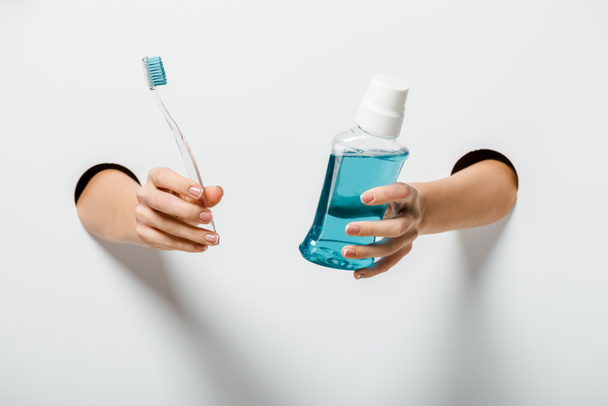Introduction:
Bad breath, sometimes referred to as halitosis, can be a disgraceful and demoralizing condition that many people experience. Everyone wants to have fresh breath, but what causes it? It might be from foods, underlying health concerns, or improper dental hygiene. Of all the products available to fight bad breath, mouthwash is the most effective and practical.
In this comprehensive guide, we will explore how mouthwash for bad breath can be a game-changer in your oral care routine.
Understanding Bad Breath:
Before delving into the effectiveness of mouthwash, it’s crucial to understand the common causes of bad breath. Poor oral hygiene is a primary culprit, as bacteria in the mouth break down leftover food particles, releasing sulfur compounds that contribute to unpleasant odors. Additionally, dry mouth, certain foods, tobacco use, and medical conditions such as gum disease and respiratory infections can all contribute to halitosis.
The Role of Mouthwash:
Mouthwash, also known as oral rinse, has been a staple in oral care routines for decades. Its primary purpose is to freshen breath, but the benefits extend beyond mere cosmetic improvements. Mouthwash for bad breath typically contains antibacterial agents that target and kill the bacteria responsible for foul odors. Additionally, it helps to neutralize acids and plaque, promoting overall oral health.
- Bacterial Combat: One of the key advantages of using mouthwash is its ability to combat the bacteria that reside in the mouth. These bacteria, if left unchecked, can lead to the formation of plaque and the release of foul-smelling sulfur compounds. Mouthwash helps eliminate these bacteria, addressing the root cause of bad breath.
- Plaque Prevention: Plaque buildup not only contributes to cavities and gum disease but also plays a significant role in bad breath. Mouthwash contains ingredients that help prevent the formation of plaque, ensuring that your oral hygiene remains in top-notch condition.
- Neutralizing Acids: Some mouthwashes are formulated to neutralize acidic conditions in the mouth. This is particularly beneficial because acidic environments can contribute to the growth of bacteria and the development of bad breath. By restoring a balanced pH, mouthwash helps create an inhospitable environment for odor-causing bacteria.
Choosing the Right Mouthwash:
Not all mouthwashes are created equal, and choosing the right one for combating bad breath is crucial. Look for mouthwashes labeled as “antibacterial” or “antiseptic,” as these formulations are specifically designed to target the bacteria responsible for halitosis. Fluoride-containing mouthwashes offer the added benefit of strengthening tooth enamel and preventing cavities.
Incorporating Mouthwash into Your Routine:
To maximize the effectiveness of mouthwash for bad breath, it’s essential to use it as part of a comprehensive oral care routine. Here’s a step-by-step guide on how to incorporate mouthwash effectively:
- Brush and floss: Start by brushing your teeth thoroughly and flossing to remove food particles and plaque.
- Choose the right mouthwash: Select a mouthwash that is specifically formulated for bad breath, ensuring it contains antibacterial agents.
- Measure the right amount: Pour the recommended amount of mouthwash into a cup. Be sure not to exceed the suggested dosage.
- Swish and gargle: Swish the mouthwash around your mouth for at least 30 seconds, making sure it reaches all areas. Gargle if the mouthwash is safe to do so.
- Spit it out: Spit the mouthwash into the sink, ensuring you do not swallow it. Swallowing mouthwash can be harmful due to its alcohol content.
- Avoid eating or drinking immediately: After using mouthwash, wait at least 30 minutes before eating or drinking anything to ensure optimal effectiveness.
Consistency is key when using mouthwash for bad breath. Incorporate it into your daily oral care routine, and you’ll likely notice a significant improvement in the freshness of your breath.
Conclusion
In the quest for fresh breath and optimal oral health, incorporating mouthwash for bad breath can be a game-changer. By targeting the bacteria, preventing plaque formation, and neutralizing acids, mouthwash proves to be a valuable tool in the fight against halitosis. Choose the right mouthwash, use it consistently as part of your oral care routine, and enjoy the confidence that comes with a revitalized fresh breath.



